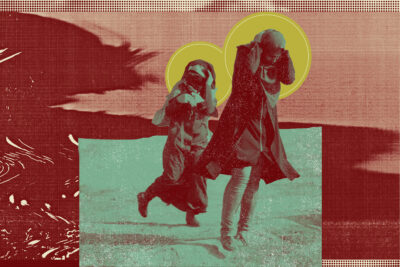A Church of Proximity: Learning to give, and share, to serve others
The following reflection was written shortly after a visit to my local supermarket during a time of Coronavirus. It was written in response to the many empty shelves that I witnessed that afternoon and in the face of our human proclivity to panic buy and to hoard at the expense of others.
Once upon a time in Russia, so the folk tale goes, there was a great famine during which people jealously hoarded whatever food they could, hiding it even from their neighbours and friends. One day, a stranger wandered into a village and began asking questions, as if he planned to stay for the night.
‘There’s not a scrap of food in the entire district’, he was told. ‘Best keep moving on’.
Oh, I have everything I need,’ he said. ‘In fact, I was thinking of making some stone soup to share with all of you’. He fetched a large iron pot from his wagon, filled it with water and built a fire under it. Then, ceremoniously, he drew an ordinary-looking stone from his bag and dropped it into the water.
By now, hearing the rumour of food, most of the villagers had come to the square or had opened their shutters to watch. As the stranger sniffed the ‘soup’ and licked his lips in anticipation, hunger began to overcome their scepticism.
‘Ah,’ the stranger said out loud, ‘I do like a tasty stone soup, but stone soup with cabbage…now that’s hard to beat’.
Soon a villager approached tentatively, holding a cabbage he’d retrieved from its hiding place, and it was added to the pot. ‘Delicious!’ cried the stranger. ‘You know, I once had stone soup with cabbage and a bit of beef as well and it was fit for a king’.
The village butcher managed to find some diced beef…and so it went on, with villagers adding potatoes, onions, carrots, mushrooms and so forth, until there was indeed a delicious meal for all to enjoy. The villagers offered the stranger a great deal of money for the ‘magic’ stone, but he refused to part with it and travelled on the next morning.
Of course, we know that the ‘magic’ was not to be found in the stone but in the genius of the stranger who, against all odds, was able to draw the villagers out from behind closed shutters and doors and out of their fear and suspicion-filled state into a position where we witness the very best of human nature, a position of openness to the other, of solidarity and the sharing of resources. Instead of ‘circling the wagons’, the villagers are enabled to draw the circle of their lives wider to include rather than exclude the other, to see the other as ‘gift’ rather than as ‘threat’. It is good to appreciate and be grateful for those who have opened doors for us in life and who have had the generosity to give of themselves rather than to keep to themselves.
The folk tale is set in a context of oppression, hunger and economic hardship. Yet, the making of the soup is an expression of solidarity, creativity and empowerment to meet shared needs in a way that overcomes the hardship. Soup nourishes and gives energy, but it also brings us together around the same table. The process of making the soup was an exercise in community building. The villagers move from a default position of self-preservation, where, bled of hope and charity, their hearts were as hard and unyielding as the stone, to a position of engagement in acts of self-sacrifice and mutual generosity.
The ‘God of Surprises’ always calls us out of ourselves, out of our self-imposed limits, to something more and, I think, herein lies the real challenge of the Christian journey: learning to move beyond our own impulses and desires in a life of willing service of others. In doing so, we discover something more (because, with God, there is always more) – a deep openness to the One who is love, justice, mercy and the source of hope and a deep desire to give of ourselves in God’s service. Nothing less will do anymore.
The ‘God of Surprises’ always calls us out of ourselves, out of our self-imposed limits, to something more and, I think, herein lies the real challenge of the Christian journey: learning to move beyond our own impulses and desires in a life of willing service of others.
There can come a time in our adult years when we are very open to a reawakening and deepening of our faith. We may find ourselves searching for something more than we presently experience. The first words of Jesus to the disciples of John took the form of the question, ‘What do you want?’ or ‘What are you searching for?’ Jesus seeks to engage with those who are searching. He enters our adult lives in response to our deepest longings. In our searching we can meet someone or some group who opens a door for us into a deeper relationship with the Lord. Through them the Lord can reach us and touch our lives in a way he had never done before, in a way beyond our wildest imaginations. God can do this right up to the very end of our lives. There is no such thing as ‘It’s too late’ with God.
The Gospel invites us not to close doors or to erect barriers not to be afraid but rather to be open to the many ways the Lord can draw us to himself and also to the ways that he may be calling us to help him in drawing others to himself.
This is essentially what Jesus’ ministry was about and continues to be about: drawing people towards him, drawing the circle wider to include rather than to exclude, dismantling barriers rather than putting them in people’s way, befriending rather than estranging others, rejecting tribalism in favour of recognising what we hold in common.
I leave the last word to Pope Francis who, for the past seven years has been leading the Church on a journey of conversion to the Christ who welcomes the stranger and who rejoices to sit at table and dine with precisely those we might choose to chase from our neighbourhoods:
“The thing the church needs most today is the ability to heal wounds and to warm the hearts of people; it needs nearness, proximity. I see the church as a field hospital after battle. It is useless to ask a seriously injured person if he has high cholesterol and about the level of his blood sugars! You have to heal his wounds. Then we can talk about everything else. But first heal the wounds.”
Related Stories

Stations of the Cross in Palestine
In Passionist spirituality, the Stations of the Cross are a journey transcending time: repeating in everyday suffering, especially now in Gaza.
Jan 25 2024

A parable to remind us that resistance matters, even in mundane things
Paul McGowan, from our friends at Pax Christi, re-examines the well-trodden 'Parable of the Talents'. What is this is not a lesson about 'gifts', but a story about collaboration and resistance?
Dec 01 2023

Experiences of Passionist prayer, pt. 3: Joanne Crompton
How do we pray? What role does prayer take in our lives? We asked three people pursuing a Passionist spirituality how their sense of prayer has changed over time.
Jul 05 2023

